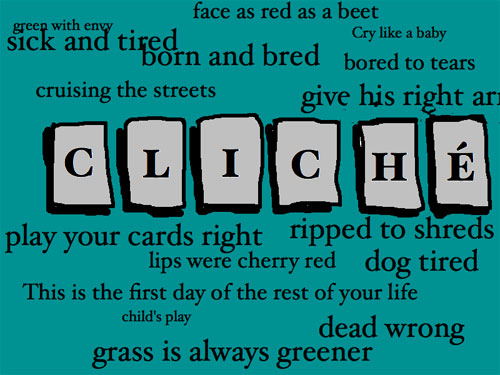All editors have a pet peeve, and I became formally introduced to mine in Adam O’Connor Rodriguez’s editing class at Portland State University. I’m not certain why my pet peeve wasn’t clear to me before; I’ve grimaced for years at phrases such as “I don’t doubt that”, “c’est la vie”, and “because I said so.” Whether you call them colloquial phrases, clichés, platitudes, truisms, or hackneyed sayings, they all demonstrate a rather sad and lazy abuse of the wonderful ways words can work for us. Here’s the problem according to Adam in his week-eight lecture notes from Book Editing:
Clichés and familiar expressions
“Clichés, unless they’re being used playfully or with irony or to demonstrate how a character speaks, are troublesome because they seem like lazy writing and generally are just that. Familiar expressions fall into the same category. If a character “hits rock bottom,” so she’s running “like a bat out of hell,” but ends up “safe and sound,” that’s pure laziness. An occasional familiar expression doesn’t kill prose, but many writers who you might think are good lean on them.”
If you’re curious about the famous authors who rely on colloquial phrases, here’s an interesting article on Ben Blatt’s recent book, Nabokov’s Favorite Word is Mauve.
Like many pet peeves, I believe the root of it lies in a rankling suspicion that perhaps you yourself are unknowingly participating in the offending peeve (indeed, is not the phrase “pet peeve” itself a cliché? Sheesh). Throughout Adam’s class, and even now, I’ve been chagrined to note all of my very unoriginal turns of phrase. I’ve been mentally collecting these often used phrases in the hopes that they won’t slip by me while I’m editing.
One of the best ways I’ve found to identify them is by noting their use in my in casual speech with friends and family. This is both a great resource and a potential pitfall, as people who spend a good deal of time communicating together also tend to speak like one another. Indeed, sayings and phrases are part of the microcosm of one’s family (or friend) culture. I use many truisms that my father used, which he lifted from his father, and, more likely than not, that he lifted from a relative too. I actually find them comforting; it’s a way to feel close to my dad even though he isn’t around anymore.
Still, I wouldn’t want to sully these phrases by using them any more than sparingly in writing. What I learned from Adam’s class and by observation is that one method of gently informing a writer that they are taking the easy road is to collect the clichés you find in their manuscript and advise them to rewrite them—unless the phrase is important because it reflects the vernacular of the region the story is set in or the manner of speech among their family and friends. If that’s the case, they should be used sparsely and within dialogue. Most of the time though, these occur when the writer is describing a situation or a person.
I almost closed with a cliché (ugh, my brain came up with “Happy Cliché Hunting!”), but caught myself. May you catch all of yours, too.

